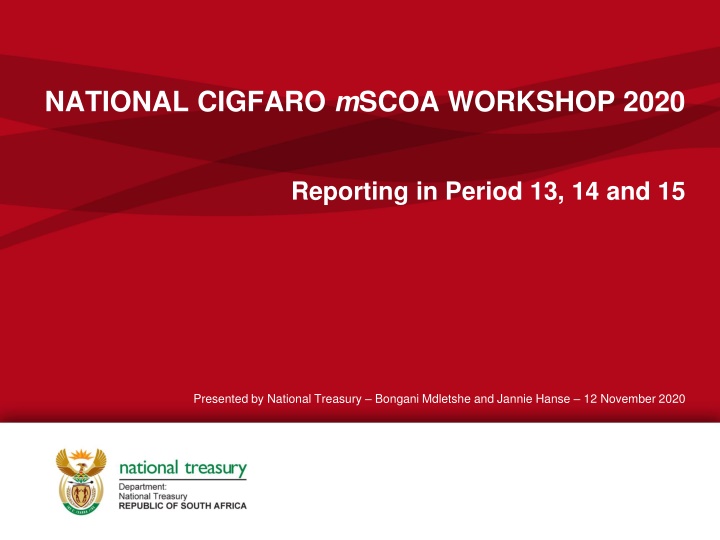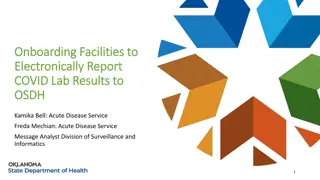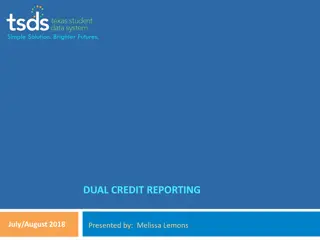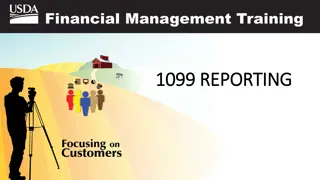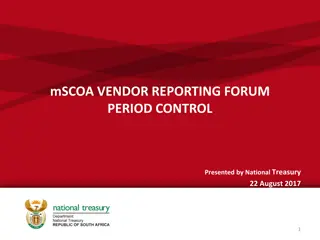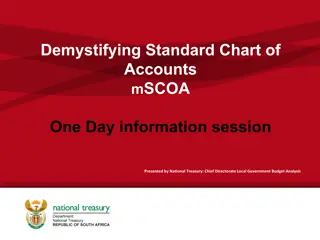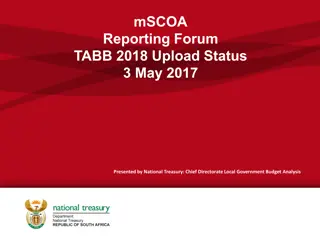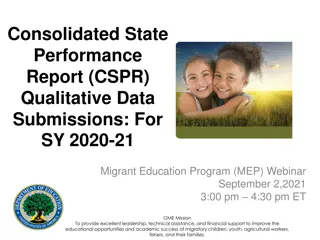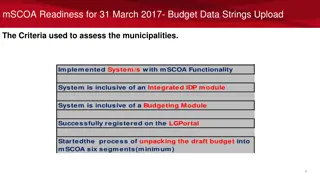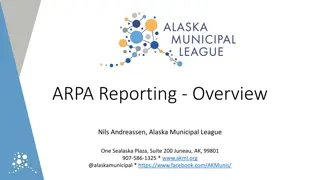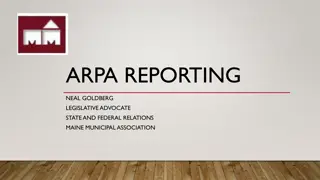Period Control Guidelines in mSCOA Reporting Workshops 2020
This workshop presented by National Treasury focuses on period control within the mSCOA environment, specifically covering periods 13, 14, and 15. The session addresses requirements for monthly period closures, year-end procedures, corrections in period 15, and AFS submission guidelines for the financial year 2019/20.
Download Presentation

Please find below an Image/Link to download the presentation.
The content on the website is provided AS IS for your information and personal use only. It may not be sold, licensed, or shared on other websites without obtaining consent from the author.If you encounter any issues during the download, it is possible that the publisher has removed the file from their server.
You are allowed to download the files provided on this website for personal or commercial use, subject to the condition that they are used lawfully. All files are the property of their respective owners.
The content on the website is provided AS IS for your information and personal use only. It may not be sold, licensed, or shared on other websites without obtaining consent from the author.
E N D
Presentation Transcript
NATIONAL CIGFARO mSCOA WORKSHOP 2020 Reporting in Period 13, 14 and 15 Presented by National Treasury Bongani Mdletshe and Jannie Hanse 12 November 2020
Purpose Purpose of the session is to provide guidance on period control in a mSCOA environment, specifically in period 13, 14 and 15 2 2
Period control in mSCOA (1) The MBRR and MFMA Circular No 80 (minimum system specifications for mSCOA) requires: Monthly period closure and certification within the statutory reporting dates o No back-dating of transactions is allowed o Balancing of the sub-system with control accounts must be a condition of any period closure Year-end closures are done in period 12 (as at 30 June of the current year). These will result in transactional transfer of opening balance to period 1 in the following year Finalisation and submission of AFS are done in period 13 (PAUD) which will result in an opening balance transactional transfer and the transactions of period 13. Figures must reconcile to pre-audited figures submitted to AG Audit approved journals will be done in period 14 (AUDA) and will result in opening balance transactional transfer and the transactions of period 14. Figures must reconcile to audited outcomes on which the AG has expressed an opinion 3 3
Period control in mSCOA (2) Period 15: o Adjustments to the AFS following the approval of the adjustments budget to authorise and legalise unauthorised expenditure (Reg. 28(6) of MBRR) and prior period corrections must be done in period 15 (GRAP 3) o Period 15 for the previous period should be closed and reported (RAUD) on when the period 13 for the current period is closed and reported (PAUD). o Some systems leave period 15 open to allow for prior period corrections after PAUD has been reported, but for the purposes of NT reporting on the audit outcomes, the final RAUD data string for the previous period must be submitted with the AUDA data string for the current period. Importantly: o Any corrections of prior period error(s) result in opening balance transactions in the subsequent years o Period closing, finalisation and audit period corrections are opening balance transactions in the current open period as well as normal transactions in the audit periods o Corrections made in period 13 to 15 must be status (end-results) based and NOT movements when submitting the mSCOA data strings 4 4
AFS submission for 2019/20 Government Gazette No. 43582 (05 Aug 2020) granted exemption from Sections 126(1) and (2) of the MFMA AFS for 2019/20 had to be submitted on/or before 31 Oct 2020 (also see MFMA Circular No. 104) to the AG, NT, PT The following must be submitted to NT: o The pre-audit AFS submitted to the AG (in PDF format) and to the LG UpLoad Portal on/or before 31 Oct 2020 o The Pre-Audited Actuals mSCOA data strings (PAUD), CRPA (pre-audit creditors) and DBPA (pre-audited debtors) data strings uploaded to the LG UpLoad Portal within 10 working days of submission to the AG If there was a Prior Period Correction of error, the RAUD must be submitted within 10 working days after Council approval of the said Prior Period Correction 5 5
In summary, what is period 13, 14, 15? Period 13 Pre-audited AFS Period 14 Audit Outcomes As submitted to AG on 31 Aug (Oct 2019/20) Allowed audit approved journals during audit process Period 15 Adjustments to the AFS and Prior Period Errors To authorise and legalise unauthorised expenditure (Reg. 28(6) of MBRR) and prior period corrections (GRAP 3) 6 6
Procedures in Period 13, 14 and 15 The following data strings should be submitted: Period 13 = PAUD Period 14 = AUDA Period 15 = RAUD Period 12 Period 13 Period 14 Period 15 Normal month end closure after x days Further adjustments and journals done before 31 August Receive audit outcomes from AGSA Make further adjustments approved by Council in Period 15 Section 71 M12 reporting on 10th working day after month end. On 31 August close Period 13 Make adjustments approved by AGSA to Period 14 Ideally doe before the start of the budget process for the new financial year 24 July verification for quarter 4, publication stats Submit AFS to AGSA, NT and PT When complete, close Period 14 Adjustments must be transferred into the current year once 30 July verification close Upload PAUD, CRPA and DBPA through LG Upload portal Upload AUDA, CRAU and DBAU through LG Upload portal Use Period 15 to produce restated outcomes when preparing AFS for new year Period 12 must now close and all balances at posting level transfer to Period 13 Transfer all balances at posting level to Period 14 Transfer all balances at posting level to Period 15 To be closed and reported (final RAUD data string) for previous period when AUDA is uploaded for current period 7 7
GRAP 3 Changes In Accounting Policy, estimates and Prior Period Errors Prior Period Errors Omissions from, and misstatements in, the entity s financial statements for one or more prior periods arising from a failure to use, or misuse of, reliable information that: (a) was available when financial statements for those periods were authorised for issue; and (b) could reasonably be expected to have been obtained and taken into account in the preparation and presentation of those financial statements. Such errors include the effects of mathematically mistakes, mistakes in applying accounting policies, oversights or misinterpretations of facts, and fraud. Applied retrospectively 8 8
GRAP 3 Changes In Acc Policy, estimates and Prior Period Errors Change in Accounting Policy: Accounting policies are the specific principles, bases, conventions, rules and practices applied by an entity in preparing and presenting financial statements. Change in Accounting Estimates: A change in accounting estimate is an adjustment of the carrying amount of an asset or a liability, or the amount of the periodic consumption of an asset, that results from the assessment of the present status of, and expected future benefits and obligations associated with, assets and liabilities. Changes in accounting estimates result from new information or new developments and, accordingly, are not corrections of errors. Applied prospectively 9 9
Practical Example Period 13 correction The CFO of Batho Pele Municipality found that the Leave Provision was inadequate with R1 000 000 at year end correction made in Period 13 Segment Debit Credit Project Operational: Municipal Running Cost Function: Finance and Administration: Core Function: Administrative and Corporate Support Expenditure: Employee Related Cost: Municipal Staff: Salaries, Wages and Allowances: Allowances: Service- Related Benefits: Leave Pay Fund: Operational: General Revenue: Taxes: Property Rates: Levies Administrative or Head Office Default Project Function: Finance and Administration: Core Function: Administrative and Corporate Support Function Liabilities: Current Liabilities: Provision and Impairment: Leave: Increases Item Fund: Operational: General Revenue: Taxes: Property Rates: Levies Administrative or Head Office Funding Region Default Default Costing R1 000 000 R1 000 000 Amount 10 10
Practical Example Period 13 correction MSCOA Chart Navigation MSCOA Chart navigation Item Liabilities MSCOA Chart navigation Item Expenditure 11 11
Practical Example Period 14 correction The Auditor-General raised a finding that the Batho Pele Municipality understated the Creditor balance for Eskom Bulk Purchases by R7 000 000 Correction made in Period 14 Segment Debit Credit Municipal running Costs Default Project Function: Energy Sources: Core Function: Electricity Function: Energy Sources: Core Function: Electricity Liabilities: Current Liabilities: Trade and other payables: Bulk Electricity: Deposits Function Expenditure: Bulk Purchases Item Fund: Operational: General Revenue: Service Charges: Electricity Whole of Municipality Fund: Operational: General Revenue: Service Charges: Electricity Funding Region Whole of Municipality Default Default Costing R7 000 000 R7 000 000 Amount 12 12
Practical Example Period 14 correction MSCOA Chart Navigation MSCOA Chart navigation Item Expenditure MSCOA Chart navigation Item Liabilities 13 13
Practical Example Period 15 correction During the preparation Annual Financial Statements the Batho Pele Municipality discover R8 000 000 under statement of Depreciation for Motor Vehicle for prior year. Segment Debit Project Default Function Function: Finance and Administration: Core Function: Administrative and Corporate Support Item Net Assets (LN) : Accumulated Surplus/(Deficit) : Correction of Prior Error Credit Default Function: Finance and Administration: Core Function: Administrative and Corporate Support Assets: Non-Current Assets: Property Plant and Equipment: Transport Assets: Owned and In- use: Accumulated Depreciation: Depreciation: Other Charges Fund:Non-Funding Whole of Municipality Default R8 000 000 Funding Region Costing Amount Fund:Non-Funding Whole of Municipality Default R8 000 000 14 14
Practical Example Period 15 correction MSCOA Chart Navigation MSCOA Chart navigation Item Assets MSCOA Chart navigation Item Net Assets 15 15
Conclusions Municipalities have to close their system at a particular period before a data string is generated The system should not be re-opened to correct data once it has been closed for a particular period (as per MFMA and mSCOA Regs) If a municipalities budget, transact and report directly in and from their financial systems, the data on the system will be credible as the system have build-in controls to flag when transactions are not in line with the approved budget/adjustment budget The large amounts of IUFW expenditure tells us that municipalities are not working in their systems System vendors have been requested demonstrate to NT and PTs how their systems handled periods 13, 14 and 15 during the week of 16 to 20 Nov 2020 16 16
THANK YOU For information on local government finances, please visit: https://municipalmoney.gov.za For additional information on national and provincial budgets, please visit our new budget data portal: https://vulekamali.gov.za
